SNL Girl Talk and Prosody as Pragmatics
« previous post | next post »
Below is a guest post by Nicole Holliday.
This past weekend, Saturday Night Live featured a skit called Girl Talk, starring Ego Nwodim, Megan Thee Stallion, and Punky Johnson. The basic conceit of the skit is that Monique Money (played by Ego Nwodim) is the host of a talk show called “Girl Talk”, where she provides advice to distressed guests. But the joke is that the only actual lexical item used to provide or respond to advice on the show is “girl”. The word “girl” has a long-documented history as a vocative of solidarity and/or distancing within AAE-speaking communities, but of course it is so widespread in popular culture now that white audiences are also likely to be familiar with it. As a sociophonetician who studies prosody, I was immediately interested in how pragmatic meaning would be accomplished via the different realizations of “girl” through the skit. Though there are only 16 occurrences of “girl” (and one of “bro”), their duration and prosodic patterns do tell us a bit about how these speakers play with prosody.
https://www.youtube.com/watch?v=aC83lnbVleU
In this first example, Monique, the host, inquires about a guest’s issue. The first guest is Stacy (played by Megan Thee Stallion), who says that her boyfriend has been cheating but wants her to move in with him. When Ego responds to Stacy, her first instance of “girl” is realized with a high tone followed by a level boundary (H* H-L%).
In Stacy’s first response, she uses the same prosodic pattern as Monique. But as Stacy starts to realize what Monique is suggesting in her case, she changes to a sequence of H* L-L% patterns, which are more in-line with expectations for the majority of English declarative utterances, indicating that she’s providing Monique with new information.
In the second segment, Stacy remains on the couch while Monique questions a new guest, Kim (played by Punkie Johnson) who is overwhelmed by current events. Once Kim explains her problem, Monique states that this problem seems “complex” and therefore requests subtitles for “any white people or men tuning in”. This is a fun play on the fact that the Black female hosts and guests have sufficient in-group knowledge to read the pragmatic meanings of each others’ prosodic and gestural patterns, but that out-group viewers may not. Monique’s patterns do change here somewhat, but Kim’s are especially interesting, because her productions of girl are significantly longer than Stacy’s in the first segment, but also more likely to contain the bitonal pitch accent, L*+H, with a long peak delay. In previous work, I have observed that bitonal pitch accents with such long delay intervals tend to occur more commonly in AAE than in “standard” white varieties.
The other comedic element in this section is the fact that Stacy, the first guest, eventually chimes in with a response to Kim’s concern about the war in Ukraine (which we learn is her problem from the subtitles). When Stacy does this, she uses a high-low-high low-low contour (H* L+H* L-L%), potentially indicating information that is mutual belief in a shared fact. Also of interest here is the fact that Stacy stresses the final syllable of “girl” which causes her to add an epenthetic schwa, allowing space and time for greater pitch movement.
The subtitle for Stacy’s use of girl here, however, is a wall of text written in a high-register scholarly tone, and the other guests subsequently congratulate her for her knowledgeability.
Finally, in the third segment, Monique welcomes a guest named Paul, a white guy who seemingly ended up on the show somewhat accidentally. Paul’s issue is that he is trying to decide whether he should quit his job and purse his passion for drawing. In the utterances where Monique responds to Paul, she uses very long realizations of “girl”, and these get longer as Monique realizes that Paul isn’t immediately understanding her advice. Eventually, Monique asks for Stacy’s help (given that she’s shown herself to be an expert, and because she has a boyfriend). When Stacy responds to Paul, instead of “girl”, she says “bro”, with a high tone followed by a fall (H* L-L%), although with a fairly long duration (316 ms). At this point, Paul finally understands that the advice is not to quit his day job.
However, Paul gets a little bit too comfortable, and attempts to thank the women by uttering “girl”, with a very long duration (614ms) and super high rising terminal pattern (H* H-H%, difficult to see due to overlapping noise). He is subsequently thrown off the stage by the cast and audience who do not accept his use of “girl” as an outsider.
This skit works as comedy because of existing mainstream ideologies about the use of “girl” in AAE, but also because speakers and listeners have strong intuitions about the prosodic patterns associated with particular pragmatic meanings, especially when uttered by different types of speakers.
NH: Thanks to Tricia Irwin for inspiration, and to Byron Ahn for sanity checking!
Above is a guest post by Nicole Holliday.
For some older takes on a similar idea, see "Dude", 12/8/2004, and "Duding out", 12/10/2004.
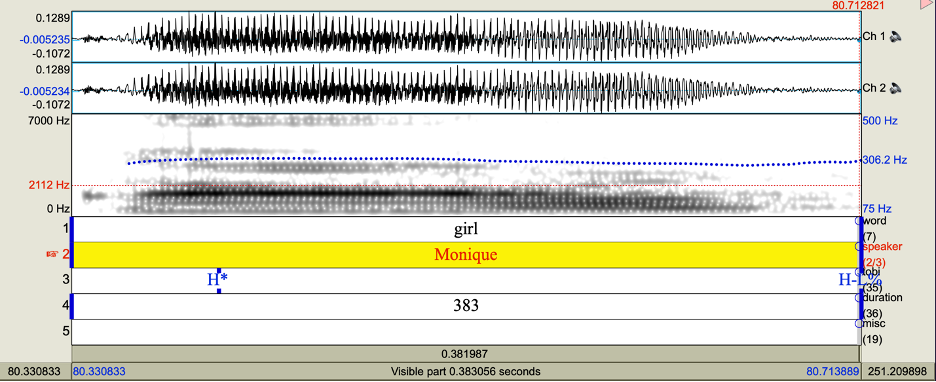
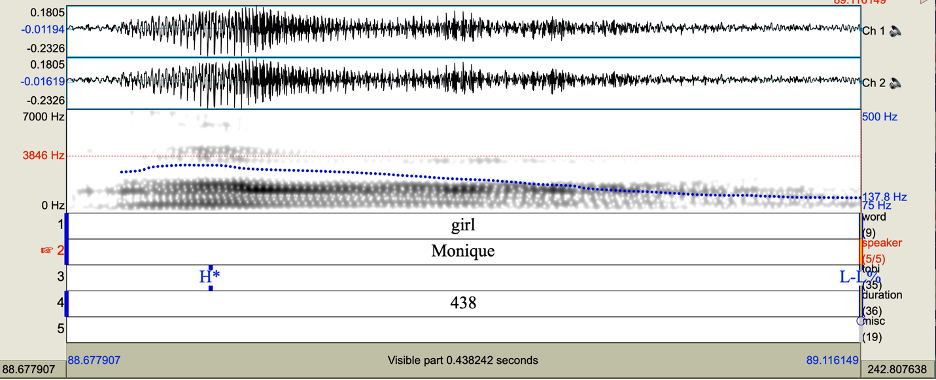
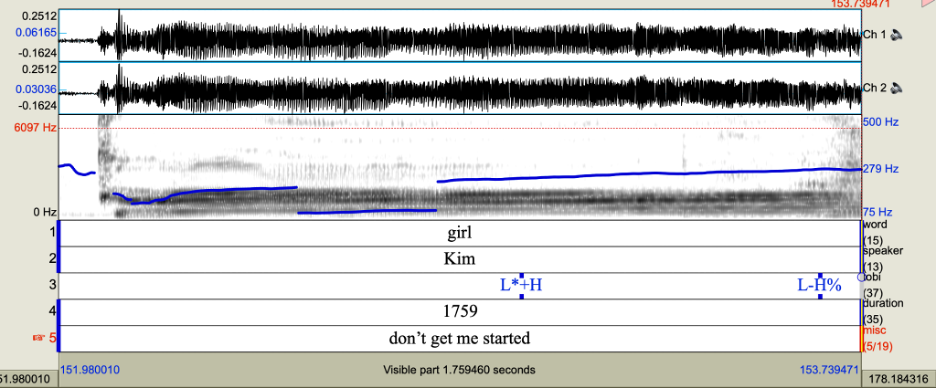
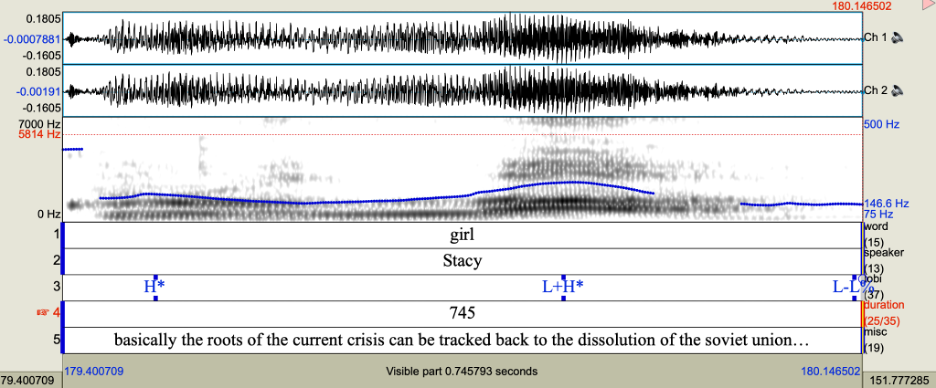
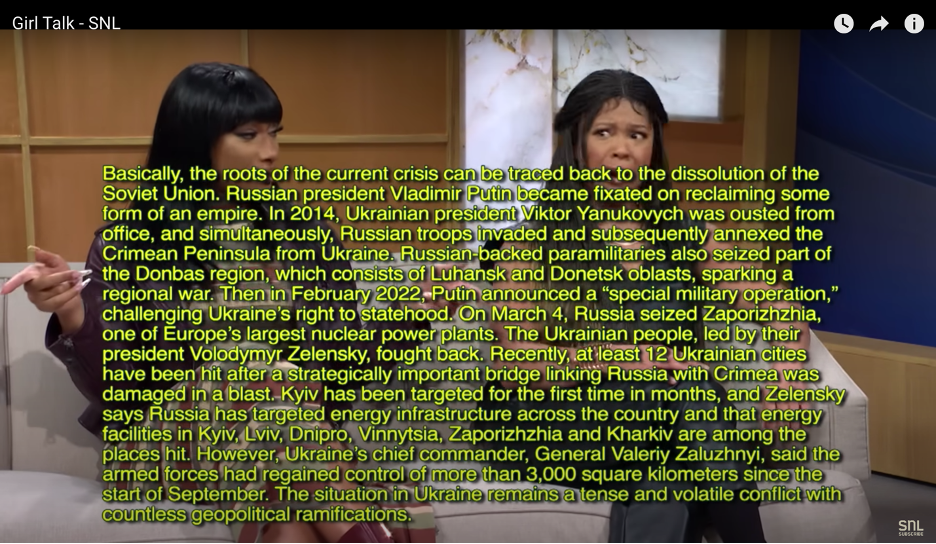
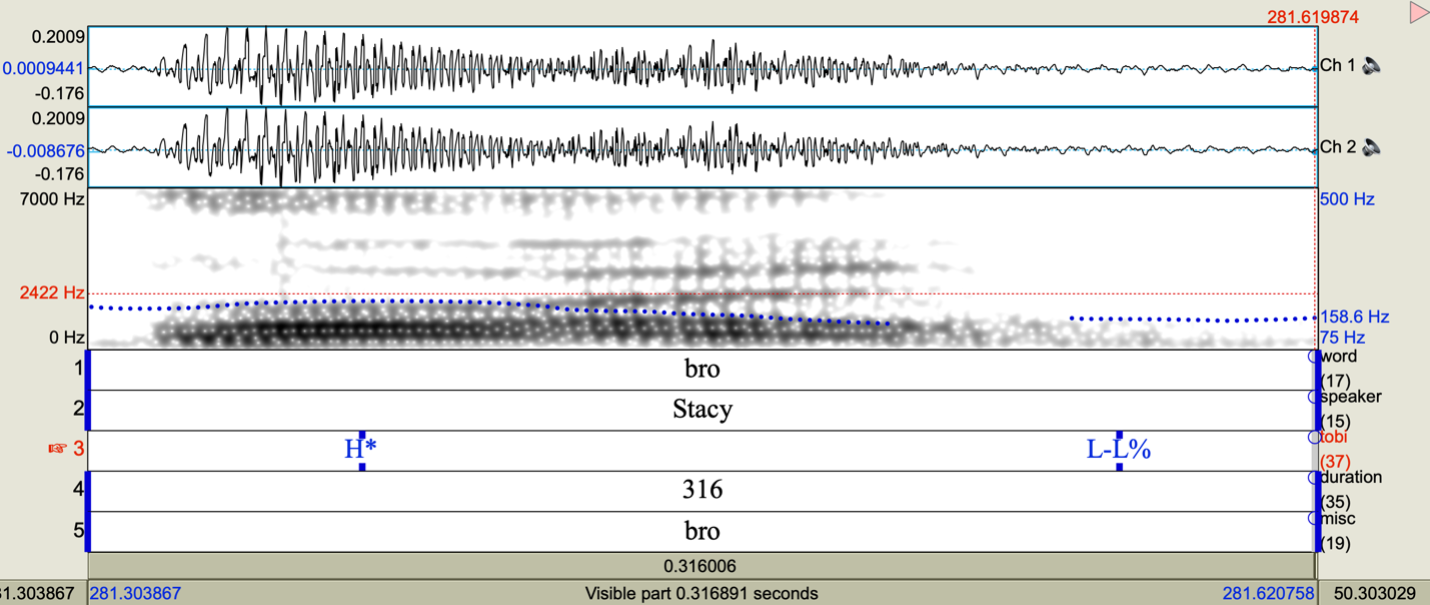
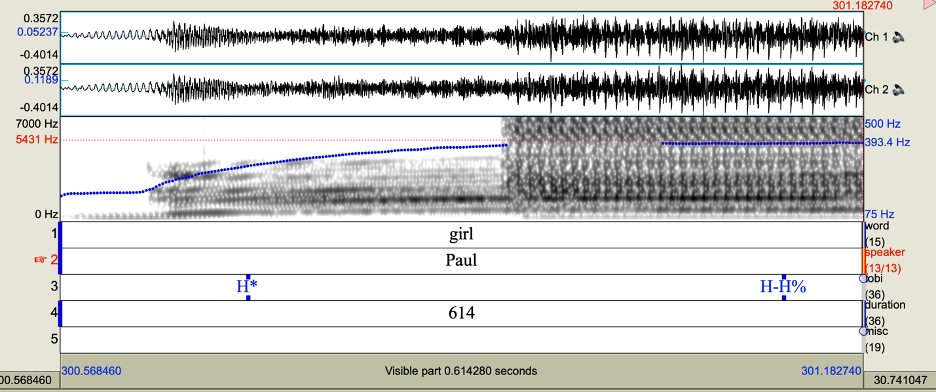
Charles Troster said,
October 21, 2022 @ 4:35 pm
This skit is the only thing that was funny all night. Ego Nwodim and Punkie Johnson have a bright future ahead.
Jonathan Smith said,
October 21, 2022 @ 5:13 pm
Seemingly inspired by the classic Key & Peele sketch —
Okay
Stephen Goranson said,
October 22, 2022 @ 8:34 am
Great sketch.
Maybe it's just me, but lately I haven't heard "you go girl."
bks said,
October 22, 2022 @ 10:13 am
Fuhgetaboutit!
https://youtu.be/44PfcCmfY-0
Chris Button said,
October 22, 2022 @ 11:12 am
I’d be curious to see an O’Connor & Arnold (1973) approach to intonation applied to this.
Jamie said,
October 22, 2022 @ 5:14 pm
When I lived in the UK, I got my hair cut at a local barber where most of the customers were young (well, much younger than me) white males — at least 50% of their conversation seemed to consist of the word “mate” in various intonations
Philip Taylor said,
October 23, 2022 @ 6:47 am
And I have recently become aware that a large number of my fellow bowlers address each other as "mate" when giving advice or feedback. Location: south-west England (Cornwall).
Biscia said,
October 24, 2022 @ 12:23 pm
There’s a terrific dubbing of a scene from Rocky 3 by the Tuscan comedy team Nido del Cucolo: Rocky is trying to tell Adrian about a conversation with his boss at work, but their exchange seems to have been almost entirely made up of the Livornese exclamations “boia” and “deh.” Adrian tells him that for twenty years now she hasn’t understood a goddamn thing he says. Having spent a lot of time in that area, I can empathize. https://www.youtube.com/watch?v=_9K1nFS26mY